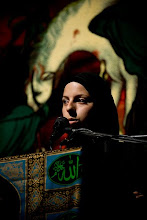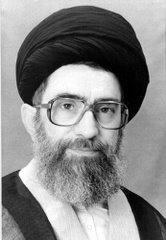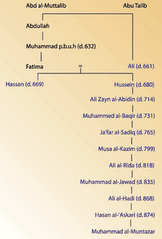
In this Muslim-majority country, it's OK to be Christian, Buddhist or Hindu. But not Shiite.
Malaysian religious police raided a three-story shop-house last month and detained more than 100 Shiites who had gathered to mark the death of one of their most beloved saints, Prophet Muhammad's grandson, who was killed in the year 680.
It was one of the largest such sweeps in years, sparking outrage and fear in the country's small but growing Shiite community. Some religious scholars see it as a worrying sign that Islamic authorities are becoming more hard-line.
"Malaysia is trying to become a country a la Taliban that only allows one school of thought," said prominent scholar Asri Zainul Abidin.
Despite its reputation for religious tolerance, Malaysia has been quietly discriminating against its own for years. The government recognizes only the Sunni branch of Islam and prohibits all others including Shiites, the world's second largest Islamic group.
Shiites face discrimination elsewhere, but Malaysia appears to be the only place that actually outlaws them.
"We are the oppressed people," said Kamil Zuhairi Abdul Aziz, the Iranian-trained religious leader for the Lovers of the Prophet's Household, the Shiite group raided by the religious police on Dec. 15.
The event they were commemorating, the death of Prophet Muhammad's grandson in the seventh century, helped seal the split between the majority Sunnis and the Shiites, whose strongest base today is in Iran.
Kamil estimates there are at least 40,000 Shiites among Malaysia's 16 million Muslims, though the number could be higher as many conceal their faith to avoid trouble. A few have been detained in the past, and some sent to faith rehabilitation centers, but there is no official data on the number of arrests.
Malaysia's ban was issued in 1996 by the National Fatwa Council of top Islamic clerics and seen as unusual in the Muslim world. The council comes under the government's Islamic Advancement Department, so its decrees are de facto law.
The 3 million Shiites in neighboring Indonesia are able to practice freely, though they are often harassed on hard-line Sunni websites. In Bahrain, the government cracks down on Shiite activists, fearing they could be a backdoor for Iranian influence.
Sunni extremists have bombed Shiite gatherings in Pakistan, and much of the violence in Iraq has been between Sunni and Shiite militias as the two sides vie for power.
It's not clear what prompted the recent raid in Malaysia, but Islamic officials defend the ban as crucial to prevent unrest among Muslims.
"Shia is an Iranian sect," said leading cleric Harussani Zakaria, a member of the National Fatwa Council. "It has expanded secretly and now has many supporters who are starting to practice their faith in public. We don't want any religious differences. They are a threat to Muslim unity in Malaysia."
In defense of the raid, several Islamic officials said Shiism could give rise to fanatics as it permits the killing of Muslims from other sects, a claim denied by the Iranian embassy and Shiites here. Home Minister Hishammuddin Hussein, responding to reporters, said that Shiites don't pose a threat to national security.
The Iranian embassy issued a statement urging the government to prevent the spread of such false information. "Currently, there are about 400 million followers of the radiant path ... in the world and such baseless statements are utter disrespect to all of them," the statement read in part.
Some Malaysian Shiite families have practiced for generations while many others were exposed and subsequently converted to Shiism after the 1979 Islamic Revolution in Iran.
Many meet in one of 40 "hauzars," or "houses of knowledge." The one that Kamil leads, the most prominent and largest with 500 members, is on the top floor of a shop-house in a suburb of the city of Kuala Lumpur.
On Dec. 15, religious police arrived in trucks and detained about 125 people, including some 30 foreigners, mostly from Pakistan. Most were released on bail and given hearing dates at the Shariah court, which adjudicates religious cases.
Officials have said the foreigners are expected to be let off, but the Malaysians could be charged with following the teachings of a deviant movement, which carries a penalty of up to two years in prison.
Kamil has been charged with insulting Islamic officials, with his hearing set for Feb. 17.
His group has turned to the government-backed Human Rights Commission of Malaysia to demand the right to worship freely .
Mastura Ahmad, a 46-year-old homemaker among those detained, said she became a follower after marrying her Shiite husband, whose ancestors are from Indonesia.
"I feel comfortable with Shia. There is more guidance given and I feel safer. But I don't declare my faith openly because people don't understand. My neighbors will gossip about it and label us as deviants and we may be ostracized," she said.
Followers still gather at Kamil's hauzar, but iron grills have been installed at the entrance, in part because of concerns that drugs or explosives could be planted in the center to undermine the group.
Some 100 followers filed in for prayers on the first Tuesday of the new year. A wall mural depicting Noah's Ark greeted them as they entered a long carpeted hall draped with banners in Arabic and separated into sections for men and women.
During the one-hour session, Kamil led prayers over a loudspeaker. Then, poems were read to continue the mourning for the grandson of Prophet Muhammad.
"Here in Malaysia, they cannot accept the differences," Rashid Ahmad, a 46-year-old follower, said before the service. "There has been a campaign of demonizing us by the religious authorities. They are jealous of our influence. In the whole world, Shia is awakening."
He requested not to be photographed to protect his identity as his child is receiving a government scholarship, and he fears it could be withdrawn.
Ambil sini.
Malaysian religious police raided a three-story shop-house last month and detained more than 100 Shiites who had gathered to mark the death of one of their most beloved saints, Prophet Muhammad's grandson, who was killed in the year 680.
It was one of the largest such sweeps in years, sparking outrage and fear in the country's small but growing Shiite community. Some religious scholars see it as a worrying sign that Islamic authorities are becoming more hard-line.
"Malaysia is trying to become a country a la Taliban that only allows one school of thought," said prominent scholar Asri Zainul Abidin.
Despite its reputation for religious tolerance, Malaysia has been quietly discriminating against its own for years. The government recognizes only the Sunni branch of Islam and prohibits all others including Shiites, the world's second largest Islamic group.
Shiites face discrimination elsewhere, but Malaysia appears to be the only place that actually outlaws them.
"We are the oppressed people," said Kamil Zuhairi Abdul Aziz, the Iranian-trained religious leader for the Lovers of the Prophet's Household, the Shiite group raided by the religious police on Dec. 15.
The event they were commemorating, the death of Prophet Muhammad's grandson in the seventh century, helped seal the split between the majority Sunnis and the Shiites, whose strongest base today is in Iran.
Kamil estimates there are at least 40,000 Shiites among Malaysia's 16 million Muslims, though the number could be higher as many conceal their faith to avoid trouble. A few have been detained in the past, and some sent to faith rehabilitation centers, but there is no official data on the number of arrests.
Malaysia's ban was issued in 1996 by the National Fatwa Council of top Islamic clerics and seen as unusual in the Muslim world. The council comes under the government's Islamic Advancement Department, so its decrees are de facto law.
The 3 million Shiites in neighboring Indonesia are able to practice freely, though they are often harassed on hard-line Sunni websites. In Bahrain, the government cracks down on Shiite activists, fearing they could be a backdoor for Iranian influence.
Sunni extremists have bombed Shiite gatherings in Pakistan, and much of the violence in Iraq has been between Sunni and Shiite militias as the two sides vie for power.
It's not clear what prompted the recent raid in Malaysia, but Islamic officials defend the ban as crucial to prevent unrest among Muslims.
"Shia is an Iranian sect," said leading cleric Harussani Zakaria, a member of the National Fatwa Council. "It has expanded secretly and now has many supporters who are starting to practice their faith in public. We don't want any religious differences. They are a threat to Muslim unity in Malaysia."
In defense of the raid, several Islamic officials said Shiism could give rise to fanatics as it permits the killing of Muslims from other sects, a claim denied by the Iranian embassy and Shiites here. Home Minister Hishammuddin Hussein, responding to reporters, said that Shiites don't pose a threat to national security.
The Iranian embassy issued a statement urging the government to prevent the spread of such false information. "Currently, there are about 400 million followers of the radiant path ... in the world and such baseless statements are utter disrespect to all of them," the statement read in part.
Some Malaysian Shiite families have practiced for generations while many others were exposed and subsequently converted to Shiism after the 1979 Islamic Revolution in Iran.
Many meet in one of 40 "hauzars," or "houses of knowledge." The one that Kamil leads, the most prominent and largest with 500 members, is on the top floor of a shop-house in a suburb of the city of Kuala Lumpur.
On Dec. 15, religious police arrived in trucks and detained about 125 people, including some 30 foreigners, mostly from Pakistan. Most were released on bail and given hearing dates at the Shariah court, which adjudicates religious cases.
Officials have said the foreigners are expected to be let off, but the Malaysians could be charged with following the teachings of a deviant movement, which carries a penalty of up to two years in prison.
Kamil has been charged with insulting Islamic officials, with his hearing set for Feb. 17.
His group has turned to the government-backed Human Rights Commission of Malaysia to demand the right to worship freely .
Mastura Ahmad, a 46-year-old homemaker among those detained, said she became a follower after marrying her Shiite husband, whose ancestors are from Indonesia.
"I feel comfortable with Shia. There is more guidance given and I feel safer. But I don't declare my faith openly because people don't understand. My neighbors will gossip about it and label us as deviants and we may be ostracized," she said.
Followers still gather at Kamil's hauzar, but iron grills have been installed at the entrance, in part because of concerns that drugs or explosives could be planted in the center to undermine the group.
Some 100 followers filed in for prayers on the first Tuesday of the new year. A wall mural depicting Noah's Ark greeted them as they entered a long carpeted hall draped with banners in Arabic and separated into sections for men and women.
During the one-hour session, Kamil led prayers over a loudspeaker. Then, poems were read to continue the mourning for the grandson of Prophet Muhammad.
"Here in Malaysia, they cannot accept the differences," Rashid Ahmad, a 46-year-old follower, said before the service. "There has been a campaign of demonizing us by the religious authorities. They are jealous of our influence. In the whole world, Shia is awakening."
He requested not to be photographed to protect his identity as his child is receiving a government scholarship, and he fears it could be withdrawn.
Ambil sini.











No comments:
Post a Comment